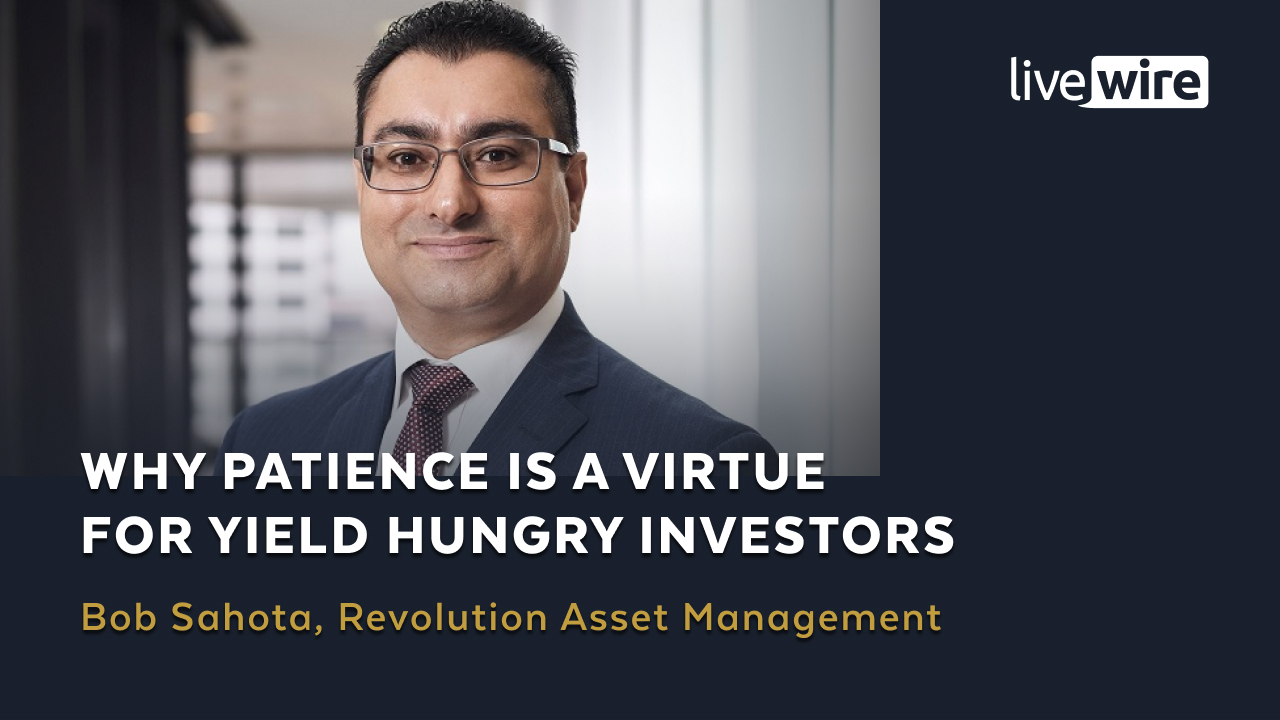Why patience is a virtue for yield hungry investors
Investing in private markets can present opportunities that aren't often available to investors. With a far longer timeline than is typical in listed equities, private investments require a different strategy, however, as well as a different mindset. We recently spoke with Bob Sahota, CIO of Revolution Asset Management which specialises in the private debt part of this market and who summarised it like this:
... you need to really come up with a very sound credit process and credit discipline. You get to say yes only once. Once you're in, you're strapped in for the ride, whether it's a nice, smooth ride or one that's a hairy roller coaster ride.
In this short Q&A with Bob, he explains how he mitigates this risk, and how his private debt strategy has been able to largely avoid the 'hairy roller coast ride' and even provide investors with returns in excess of its target range. Read on for the highlights from this informative discussion with a leader in his field.

How well has the government cushioned the negative impacts on credit?
I've got to say all hats off to the Government in the way that they've responded. They came out with an extremely fast reaction to the pandemic with the fiscal stimulus, alongside the rate cuts on the monetary policy side to really cushion the impact, to really get us through this bridging period.
We hope that with what we've experienced in Australia, and particularly bearing out with the lockdowns and the restrictions, is that the COVID-19 numbers that we're seeing here are far lower than in other parts of the world, much like our neighbours in New Zealand. This means we might get some semblance of order in our economy, where the job keeper and the job support packages are instrumental in getting people through this period.
And the $200 billion headline number is quite dramatic when you think about a Government that's quite conservative and that was really fixated on a Government surplus, has turned around and actually spent that sort of money to help people through. I think it does cushion a lot of the impact of it, particularly unemployment when you think about the GDP impact to the country.
Early stages, if there were no intervention by the Government, many were saying we would get 15%, 16%, 17% type of unemployment rates. Today I think we, along with others, feel like that might get contained by high single-digit type unemployment, depending on where we go to from here on the path to recovery.
There tends to be a focus on the negatives in times like this. If we flip to the positives, what are some of the opportunities for you?
The one key thing to understand with the opportunities in the market is you need patient capital. Patient capital in terms of the way that we structured our strategy, that enables us to have dry powder at times when others are looking to seek out that liquidity.
What does that mean? Some of our peers have made illiquid investments, but then on the other side have offered liquidity in their own funds, either daily, weekly, monthly liquidity. The way that we've constructed our business is to make sure we've never been in a position where we have to force sell any assets, even in a normal market, let alone a dislocated market.
So, what does that mean in this period? As other funds are forced to sell assets, we find we're not a distressed debt manager. We never will be. That's not our mantra. We're a par loan manager that looks to invest in ‘sleep at night’ credits. What we do look for though in periods like this with regard to opportunities, is investing in assets that are otherwise performing assets, buying them off distressed sellers at a time where there's not much liquidity in the markets.
So that manifests in that the deals we've purchased and the transactions that we've invested in our first fund, we've been able to buy in our second fund because we're monitoring those very closely at very good discounts to the original face value. The yield on those investments for exactly the same security that we are in, in one fund, we've been able to buy for instance, at 90 cents in the dollar for the other fund.
This means you can get a very good risk-adjusted return and actually get a higher yield for your investors in this period with even less risk.
Have you been able to avoid some of the more affected sectors?
We really avoided some sectors that were pro-cyclical. So retail, hospitality, tourism, mining, property development and construction, all areas where we saw a lot of opportunities, but ones that we've actually turned down, because we had a strong mantra of saying, "we want to back companies that are going to be able to see a cycle through."
Meanwhile, sectors such as healthcare, consumer staples, mission-critical software and longstanding providers of non-bank lending, such as Latitude, Pepper, FlexiGroup and Bluestone. These are companies that we've backed and, have supported the large acquisitions that we saw in 2019.
One of the busiest M&A periods of my career was 2019. Companies like Arnott's Biscuits was acquired by KKR. Healthscope Hospitals was acquired by Brookfield. We had Genesis Care in our first fund that actually came back for refinance, one of the largest providers of cancer treatment in the country. MYOB, a leading provider of accounting software solutions that's had a 20-year market-leading position.
These are the kind of companies that we felt from a senior secured point of view, with a lot of equity sitting below us in the capital structure, would be able to weather any sort of downturn as we looked at potentially a case where defaults pick up.
What are some of the risks you're observing in the market?
I think some of the bigger risks that we are seeing come from partly completed construction of residential apartments, for instance, where we see there's already been a large increase in vacancy rates in New South Wales, and Sydney in particular. Where there is partly completed construction of these new towers, what will be the experience when it comes time to settle those loans with people that have bought them off the plan?
Looking at the retail sector, what does the recovery look? When everybody's now used to buying a lot of their goods online? Will people be able to, or even want to get out of their lounge room and go out shopping for goods when they can just go online?
What is the impact on commercial office buildings? People are now really used to working from home, even dinosaurs like myself who were always used to coming into work and sitting in an office all day, are having to adjust to a new world out of necessity.
What does that impact when even large organisations are saying, "well, maybe we can do with 50% of the office space?" That could lead to quite a dramatic shift to an asset class that was formerly thought to be extremely defensive, but actually could come under quite a bit of valuation pressure going forward as a result of falling demand.
What is a key risk in investing on the private side?
The risk in private markets is the fact that you are illiquid. So once you make an investment, you don't get the luxury of being able to trade out of it − as you do in listed equities.
So you need to really come up with a very sound credit process and credit discipline. You get to say yes only once. Once you're in, you're strapped in for the ride, whether it's a nice, smooth ride or one that's a hairy roller coaster ride.
Understanding that you are investing on a hold-to-maturity basis, is the reason why you need to choose a very good manager who's got the experience of running private debt through a full credit cycle. And understanding that there's a very disciplined approach to investing will mean that you can actually deliver very good income with stability, with very low volatility through the cycle.
What is the target range that you're trying to hit?
In the past where we had base rates in the order of 6%, 7%, 8%, you could actually buy quite conservative fixed income instruments. And they would give you two things. They would give you income. And they would give you capital protection and diversification benefits, such that if other riskier asset classes underperformed, these would shelter your losses by outperforming in those periods.
What we found though through this pandemic and the current dislocation, is a concerted effort by all major central banks of the world to reduce their rates, and in some cases go negative. Even in this country, we've got a 25 basis point cash rate. Unprecedented.
So today, even the most conservative asset class like fixed income and traditional bonds provide you only really insurance benefits, should there be any further deterioration from here, with little to no income.
Private debt, on the other hand, benefits from being in private markets where investors not only get a very good return for the actual credit risk of that particular investment, but also get an illiquidity premium. And in this period, we've got anywhere from a 1% to 3% increase in what we expect the yield to be as a result of that illiquidity premium, which has grown.
Through the cycle, we have a target return of RBA cash, plus 4% to 5%. Now, since the inception of our first fund, which we began in late 2018, we've been able to produce returns ahead of that target. So above 500 basis points or 5% over the cash rate. Currently, our running yield in our second fund is 5.6%.
Even though base rates have come down, the yield on that is still quite attractive when you look at other asset classes. We feel as though that is a very attractive yield, and if you're secured, you're the top end of the capital structure, and this is in conservative sectors and industries where you can deliver that income on a quarterly basis to investors.
Looking to learn more about the role of private debt in a balanced portfolio?
Defensive, capital-protected, private debt is becoming increasingly appealing to investors as a viable asset class for a number of reasons. Unlike many assets, this strategy generates income through market cycles and it can provide diversification away from the publicly listed, big-four Australian banks and broader market movements.
For more information visit the Revolution Asset Management website or send an enquiry using the 'contact' button below.



